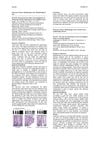 March 2023 in “International Journal of Biomedicine”
March 2023 in “International Journal of Biomedicine” Hair loss from Telogen Effluvium can be managed by treating the underlying cause and may improve with treatments like minoxidil.
 February 2023 in “International Journal of Medical Arts”
February 2023 in “International Journal of Medical Arts” Trichloroacetic acid is a safe and effective treatment for hair loss in alopecia areata patients.
 May 2022 in “Acta Scientific Women's Health”
May 2022 in “Acta Scientific Women's Health” A woman lost over 80% of her hair due to a condition called telogen effluvium after having COVID-19.
 April 2018 in “Radiotherapy and Oncology”
April 2018 in “Radiotherapy and Oncology” Mitochondria may influence how cells respond to radiation, affecting nearby non-irradiated cells.
 January 2018 in “Elsevier eBooks”
January 2018 in “Elsevier eBooks” The document concludes that alopecia has various forms, each with specific treatments, but no definitive cure for certain types like CCCA has been proven.
 September 2017 in “Journal of Investigative Dermatology”
September 2017 in “Journal of Investigative Dermatology” Aging causes sweat glands to shrink and move upward, leading to less elastic skin and more wrinkles.
 January 2017 in “Journal of traditional medicine & clinical naturopathy”
January 2017 in “Journal of traditional medicine & clinical naturopathy” Combining trichology and homeopathy is effective for diagnosing and treating hair loss.
 December 2014 in “Bali Medical Journal”
December 2014 in “Bali Medical Journal” Females have higher estrogen receptor levels in hair than males, and these levels decrease in white hair compared to black hair.

Dermal stem cells help regenerate hair follicles and heal skin wounds.
 September 2016 in “Journal of the Egyptian Women's Dermatologic Society (Print)”
September 2016 in “Journal of the Egyptian Women's Dermatologic Society (Print)” Higher RBP4 levels found in people with two types of hair loss.
 97 citations,
September 2006 in “Pharmaceutical Research”
97 citations,
September 2006 in “Pharmaceutical Research” No treatment fully prevents hair loss from chemotherapy yet.
 77 citations,
March 2001 in “Clinics in Dermatology”
77 citations,
March 2001 in “Clinics in Dermatology” Androgenetic alopecia involves genetics, hormones, and can be treated with medications or surgery.
 76 citations,
January 2007 in “American Journal of Clinical Dermatology”
76 citations,
January 2007 in “American Journal of Clinical Dermatology” Women with PCOS often have skin problems like excessive hair, acne, hair loss, and dark patches, which can be treated with hormonal and non-hormonal therapies.
 70 citations,
February 2015 in “Expert Opinion on Drug Discovery”
70 citations,
February 2015 in “Expert Opinion on Drug Discovery” Topical drugs and near-infrared light therapy show potential for treating alopecia.
 67 citations,
August 2007 in “American Journal of Pathology”
67 citations,
August 2007 in “American Journal of Pathology” Overexpressing the mineralocorticoid receptor in mouse skin causes skin thinning, early skin barrier development, eye issues, and hair loss.
 66 citations,
March 2019 in “Cellular and Molecular Life Sciences”
66 citations,
March 2019 in “Cellular and Molecular Life Sciences” Melanocyte development from neural crest cells is complex and influenced by many factors, and better understanding could help treat skin disorders.
 60 citations,
January 2004 in “The journal of investigative dermatology/Journal of investigative dermatology”
60 citations,
January 2004 in “The journal of investigative dermatology/Journal of investigative dermatology” Applying a specific inhibitor lightens skin and hair color.
 60 citations,
September 2001 in “Journal of the American Academy of Dermatology”
60 citations,
September 2001 in “Journal of the American Academy of Dermatology” Insulin resistance contributes to hormone imbalances in many women with polycystic ovary syndrome.
 53 citations,
May 2010 in “PubMed”
53 citations,
May 2010 in “PubMed” Spironolactone helps regrow hair in women with hair loss.
 47 citations,
July 1967 in “Science”
47 citations,
July 1967 in “Science” Not eating enough protein can cause hair roots to shrink and lose color, and hair to become thinner.
 34 citations,
January 2018 in “International Journal of Dermatology”
34 citations,
January 2018 in “International Journal of Dermatology” Scalp cooling is the most effective FDA-approved method to prevent chemotherapy-induced hair loss, but more research is needed for other treatments.
 34 citations,
March 2001 in “Cleveland Clinic Journal of Medicine”
34 citations,
March 2001 in “Cleveland Clinic Journal of Medicine” Manage hair shedding by identifying triggers, possibly using supplements or medications, and tracking with a health calendar.
 33 citations,
November 2006 in “Survey of Ophthalmology”
33 citations,
November 2006 in “Survey of Ophthalmology” Madarosis is the loss of eyelashes and eyebrows due to various health issues and requires thorough examination to diagnose and treat the underlying cause.
 31 citations,
May 2012 in “European Journal of Dermatology”
31 citations,
May 2012 in “European Journal of Dermatology” Menopause affects hair and skin; more research needed for treatment.
 26 citations,
January 2019 in “Expert Opinion on Investigational Drugs”
26 citations,
January 2019 in “Expert Opinion on Investigational Drugs” New treatments for hair loss show promise, but more research is needed to confirm their safety and effectiveness.
 11 citations,
July 2017 in “Expert Opinion on Investigational Drugs”
11 citations,
July 2017 in “Expert Opinion on Investigational Drugs” New hair loss treatments may include topical medications, injections, and improved transplant methods.
 11 citations,
July 2003 in “The Nurse practitioner”
11 citations,
July 2003 in “The Nurse practitioner” New treatments for PCOS focus on managing symptoms and improving fertility.
 10 citations,
March 2015 in “American journal of primatology”
10 citations,
March 2015 in “American journal of primatology” Ingesting Leucaena leucocephala caused hair loss and increased infant mortality in ringtailed lemurs.
 9 citations,
February 2022 in “Nature communications”
9 citations,
February 2022 in “Nature communications” Rare changes in the KRT82 gene are linked to a higher risk of Alopecia Areata.
 8 citations,
October 2008 in “Medical hypotheses”
8 citations,
October 2008 in “Medical hypotheses” Baldness might be caused by scalp weight pressing on hair follicles.






























